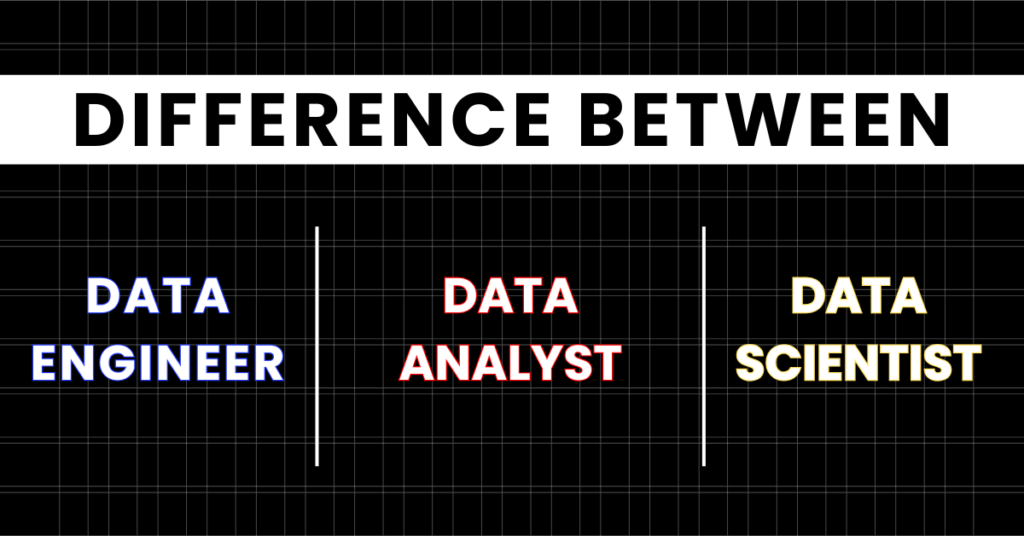Difference Between Data Engineer, Data Analyst and Data Scientist
Introduction: Are you confused between Data Roles?
If you’ve been trying to build a career in data or are hiring for data-related roles, you’ve probably wondered: What is the difference between data science and data engineering? Or maybe even what is the difference between data science and data analytics? These roles may sound similar but come with very different responsibilities, skills, and career paths.
In this blog, we’ll break down the difference between a data analyst, data engineer, and data scientist using simple vocabulary. Whether you’re a student, a professional making a career switch, or an HR professional hiring for data teams, this guide will help you understand each role clearly.
1. What Does a Data Engineer Do?
A data engineer is the architect behind the scenes. They design, build, and manage systems that collect, store, and process data efficiently.
Detailed Responsibilities:
- Data Pipeline Development: Creating automated systems that move data from source to storage to usage.
- Database Management: Designing and maintaining scalable, reliable databases (SQL/NoSQL).
- Big Data Processing: Using frameworks like Hadoop or Spark to handle massive volumes of data.
- Data Quality Assurance: Ensuring that data is accurate, consistent, and readily available for analysts and scientists.
Who Should Become a Data Engineer?
Those who enjoy backend development, cloud platforms, and ensuring systems run smoothly behind the scenes.
2. What Does a Data Analyst Do?
A data analyst focuses on interpreting existing data to generate actionable insights. They help companies make informed decisions by understanding patterns and trends in historical data.
Detailed Responsibilities:
- Data Cleaning & Preparation: They clean and transform raw data into usable formats.
- Analysis & Interpretation: They examine trends and outliers to discover actionable insights.
- Reporting & Visualization: They build dashboards and visualizations using tools like Power BI or Tableau.
- Business Communication: They bridge the gap between technical teams and business stakeholders by translating data insights into understandable recommendations.
Who Should Become a Data Analyst?
Those who enjoy exploring data, spotting patterns, and presenting clear summaries to guide decisions.
3. What Does a Data Scientist Do?
A data scientist goes beyond analysis, they build models and algorithms to predict outcomes and drive strategic decisions.
Detailed Responsibilities
- Advanced Analytics: Using statistics, math, and programming to analyze and understand complex datasets.
- Machine Learning Modeling: Training and deploying predictive models using algorithms like regression, decision trees, or deep learning.
- Experimentation: Designing and running experiments (like A/B testing) to evaluate potential business actions.
- Strategic Insights: Delivering high-value predictions and recommendations to improve business performance.
Who Should Become a Data Scientist?
Those who enjoy solving business problems and creating predictions. If you love turning complex data into smart solutions that guide real-world decisions, this role is a great fit. It combines analytical thinking with creativity to build models that shape future strategies.
Key Differences Between Data Roles
| Comparison Point | Data Engineer | Data Analyst | Data Scientist |
|---|---|---|---|
| Primary Focus | Build data pipelines and infrastructure | Analyze past data | Predict future outcomes using data |
| Technical Focus | Data architecture and ETL pipelines | Data interpretation and reporting | Modeling, prediction, and experimentation |
| End Goals | Ensure clean, accessible data | Understand trends and patterns | Build intelligent, data-driven solutions |
| Business Impact | Scalable infrastructure for analytics | Descriptive insights for decisions | Strategic decisions from data models |
| Collaboration | Provides data to analysts/scientists | Works with both scientists and engineers | Uses data prepared by engineers |
| Tools Commonly Used | Python, SQL, Spark, AWS, Airflow, Kafka | Python, Excel, SQL, PowerBI, Tableau | Python,ML libraries, SQL |
| Skill Emphasis | Programming, system design | Visualization, statistics | Machine learning, statistics |
| Learning Curve | Intermediate to Advanced | Beginner to Intermediate | Advanced |
Conclusion: Which One Is Right for You?
The right data role for you depends on your background, skill set, and interests. If you enjoy working with reports, dashboards, and historical trends, and have a foundation in tools like Excel or SQL, the Data Analyst role is a great fit. If you’re from a technical or computer science background and enjoy building systems, managing pipelines, and working behind the scenes, then Data Engineering might be your path. But if you’re strong in math and programming, and love solving business problems by building predictive models, then Data Science is the right direction. Choose the role that matches what you genuinely enjoy doing day to day.
But above all, it depends on your curiosity and what genuinely interests you. Skills can be learned, but sustained interest is what drives long-term success in any of these roles.
If you want to start a career in Data Science, INTTRVU.AI offers a structured curriculum through its Data Science & AI Certification Program.
FAQs:
1. What is the difference between a data engineer and a data scientist?
Answer: A data engineer builds the infrastructure (data pipelines, databases), while a data scientist uses that data to analyze and build models.
2. What is the difference between data science and data analytics?
Answer: Data science focuses on predictive modeling and machine learning, whereas data analytics focuses on interpreting past data.
3. Can a data analyst become a data scientist?
Answer: Yes. With additional skills in machine learning and programming, many data analysts transition into data science roles.
4. Do companies need all three roles?
Answer: Yes, especially large organizations. Each role supports a different part of the data pipeline and decision-making process.
5. Which role pays more: data analyst, data engineer, or data scientist?
Answer: Generally, data scientists earn more due to the technical and predictive nature of their roles.



